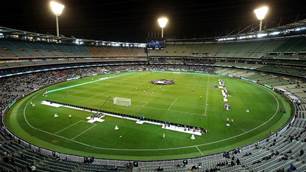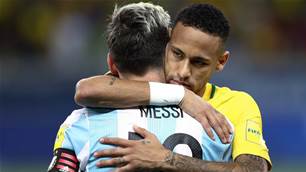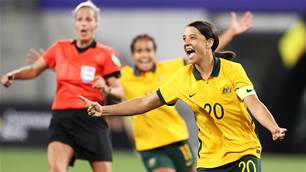EXCLUSIVE: Brazilian coach Mauricio Marquez told the FFA’s coaching conference in Sydney that Brazil does not have a formal coaching structure or organised football until U13 level.
Here is some of what Marquez, a consultant for the Brazilian Football School (CBF), Atletico Miniero and a former Brazil Futsal coach, said in his keynote presentation today.
“It’s important to respect differences. It’s a great strategy that FFA is using in this conference of getting what is good in each country and then developing the Australian way.
“We’re not here to copy the Brazilian way, the German way, the Dutch way, we’re here to build up the Australian way. And I think that’s something we have to keep in mind.
“You have your culture, you have your history and on top of that you have to develop your game. So you have to bear that in mind when you’re exchanging ideas about football.
“Let me explain just a little about the system in Brazil. Usually a coach starts working, or coaching, in the schools. Then they coach futsal, followed by football with an academy or local club and then they go into the youth teams of professional clubs. That’s the initial pathway.
“Or, you can be a former player. And then you go directly to being a professional coach. As you see, we don’t have a coaching scheme.
“It’s interesting that Brazil with such a huge tradition, we don’t have an official coaching course like you have here and UEFA A, B and so on.
“We try to build up on our history and tradition and knowledge that’s there.
“As an example, Mario Zagallo a four time World Cup winner as a coach, player and technical director, never did a coaching course in his life.
“Also a lot of coaches in Brazil, there is a lot of involvement in physical education. These physical education teachers can work in schools but they can also work in clubs as coaches.
“We don’t have a structured coaching scheme. Which in a certain way is good because then people have to find other ways to develop their knowledge. So they are looking for knowledge.
“So, we try to search out, get the knowledge that is there but we don’t want to lose the creativity or capacity to improvise of our players and coaches.
“We do have courses and seminars but it’s not from the top to the bottom. The coaches association, they build up the curriculum and they run the courses.
“Some people say that Brazil only win because they have good players. That’s not true. We have excellent quality coaches.
“A network of coaches is important too. I have coaches meetings where we talk about philosophy, methodology, but we also talk about applied areas, such as crossing and the drills we use. What sort of drills? What sort of capacity? What we can do?
“And so once a week in my role as a consultant with the clubs, I meet with coaches to share ideas and come up with something that can be applied in our daily work as coaches in tactical, psychological, physical, emotional areas.
“We also do a lot of mentoring. Assistant coaches who work alongside a coach for five, ten years before they take over. You can learn. It’s like an apprenticeship.
“I have done a survey of players from professional clubs in Brazil and those players, 70%, say they learned soccer from the streets. And then the rest in academies, homes or in the schools.
“But what is in the street? No coaching, no structure, the average number of hours a day I found was four hours.
“And another interesting thing is that our young national teams like the U/15s or U/17s don’t stay together too long, maybe 15 days before a big tournament internationally.
“They are developed through the clubs.
“We also talk about the sampling years. That’s interesting because I know in Australia you have so many different sports to play.
“And we say from six or five years old we have the sampling years in football with beach soccer, foot volley, futsal, straight football, playing with a rubber ball, a proper ball, where they can try different movements.
“So we develop our skills within the sport. And that means there is less chance of burning out the kid if they are having fun. The more the better.
“And from around 10-13 it’s more organised coaching with my suggestion being six hours of that per week.
“And in fact, the first category we start is at 13 years of age [U/13s]. Before that they are playing in the school, the streets the academies, but it’s not an organised system in that way before 13 years old.
“It’s about process rather than outcome. In the past it was about winning if you were playing for a big club like Flamengo, or Vasco, the president wanted them to win because it was a big club.
"But what they realized was that the coaches were not developing players, they were just winning games.”
“It’s important to respect differences. It’s a great strategy that FFA is using in this conference of getting what is good in each country and then developing the Australian way.
“We’re not here to copy the Brazilian way, the German way, the Dutch way, we’re here to build up the Australian way. And I think that’s something we have to keep in mind.
“You have your culture, you have your history and on top of that you have to develop your game. So you have to bear that in mind when you’re exchanging ideas about football.
“Let me explain just a little about the system in Brazil. Usually a coach starts working, or coaching, in the schools. Then they coach futsal, followed by football with an academy or local club and then they go into the youth teams of professional clubs. That’s the initial pathway.
“Or, you can be a former player. And then you go directly to being a professional coach. As you see, we don’t have a coaching scheme.
“It’s interesting that Brazil with such a huge tradition, we don’t have an official coaching course like you have here and UEFA A, B and so on.
“We try to build up on our history and tradition and knowledge that’s there.
“As an example, Mario Zagallo a four time World Cup winner as a coach, player and technical director, never did a coaching course in his life.
“Also a lot of coaches in Brazil, there is a lot of involvement in physical education. These physical education teachers can work in schools but they can also work in clubs as coaches.
“We don’t have a structured coaching scheme. Which in a certain way is good because then people have to find other ways to develop their knowledge. So they are looking for knowledge.
“So, we try to search out, get the knowledge that is there but we don’t want to lose the creativity or capacity to improvise of our players and coaches.
“We do have courses and seminars but it’s not from the top to the bottom. The coaches association, they build up the curriculum and they run the courses.
“Some people say that Brazil only win because they have good players. That’s not true. We have excellent quality coaches.
“A network of coaches is important too. I have coaches meetings where we talk about philosophy, methodology, but we also talk about applied areas, such as crossing and the drills we use. What sort of drills? What sort of capacity? What we can do?
“And so once a week in my role as a consultant with the clubs, I meet with coaches to share ideas and come up with something that can be applied in our daily work as coaches in tactical, psychological, physical, emotional areas.
“We also do a lot of mentoring. Assistant coaches who work alongside a coach for five, ten years before they take over. You can learn. It’s like an apprenticeship.
“I have done a survey of players from professional clubs in Brazil and those players, 70%, say they learned soccer from the streets. And then the rest in academies, homes or in the schools.
“But what is in the street? No coaching, no structure, the average number of hours a day I found was four hours.
“And another interesting thing is that our young national teams like the U/15s or U/17s don’t stay together too long, maybe 15 days before a big tournament internationally.
“They are developed through the clubs.
“We also talk about the sampling years. That’s interesting because I know in Australia you have so many different sports to play.
“And we say from six or five years old we have the sampling years in football with beach soccer, foot volley, futsal, straight football, playing with a rubber ball, a proper ball, where they can try different movements.
“So we develop our skills within the sport. And that means there is less chance of burning out the kid if they are having fun. The more the better.
“And from around 10-13 it’s more organised coaching with my suggestion being six hours of that per week.
“And in fact, the first category we start is at 13 years of age [U/13s]. Before that they are playing in the school, the streets the academies, but it’s not an organised system in that way before 13 years old.
“It’s about process rather than outcome. In the past it was about winning if you were playing for a big club like Flamengo, or Vasco, the president wanted them to win because it was a big club.
"But what they realized was that the coaches were not developing players, they were just winning games.”
Related Articles

'It's fair to be pretty pissed off' - MCG fans down as Argentina-Brazil tie off

Brazil and Argentina must replay World Cup qualifier













